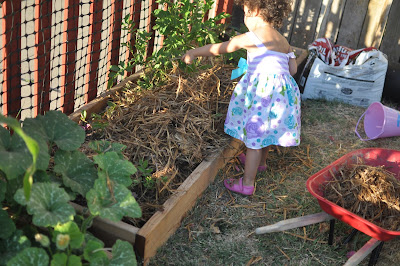Dr. Montessori observed that the daily activities- ones that we as adults see as a chore, are the most beneficial, crucial, and most interesting activities for a child. The fundamentals of taking care of oneself, the immediate environment and the greater one, cooking, cleaning, moving, not moving, the basic "how to's" are what a child craved. These activities not only mimicked adult movements but they also had a deep history that was part of the human culture as we evolved to becoming independent. What was once in a home, became obsolete as people moved into cities. Over the past century it has only become worse as more and more "conveniences" in the form of electronics and technology have become part of our everyday living. It helps an adult become more efficient, but it denies the child the opportunity to learn the fundamentals. Practical Life, therefore, is one of the most important areas and is one of the first areas introduced to a child in the classroom.
What about the home? In a home, until recently, all that was available to a child was practical life exercises. If we allow our children to participate in the daily tasks of maintaining and assisting in the home and family life, we give them the opportunity to master these skills. From eating by themselves, changing their own clothes, helping with dishes or laundry, folding clothes, making the bed, etc, a child masters his own body and is able to function in a mini-society.
As these things are fully available to every child, and for the most part free, somehow, this is still denied, belittled, or seen as a hindrance to the adult's pace of living, or as a potential hazard. Instead, cognitive activities, flash cards, electronics, and other such "task oriented" things are placed before the child believing it will aid the child's development far greater than simple home chores. As challenging as it is to incorporate the pace of the child, if we see it as a benefit to them rather than a hindrance to us, we can approach this with a better view and attitude. All research new and 100 years ago points to the benefits of working with the hand. So, before we give them something for their minds, let's give it to their hands, as this is the only and most important way it will embed in their minds.
I had meant for this to be a post of images, but alas I got carried away with text. So, instead of going on, here are some of our daily activities which are not given as lessons, but as part of everyday living.
For more check out kids in the kitchen, and Road to Independence.
Also, check out The Full Montessori's post on how to LIVE Montessori. She does an excellent job explaining the developmental planes a child is going through at the 0-6 stage.
gardening
cooking
saving seeds
hanging up laundry- cleaning rags.
washing their muddy shoes
washing dishes
Lots and lots of gardening
choosing, and packing their clothes and toys before a trip
concentration
helping put clothes in the washer
loading the dishwasher
multi-tasking. Cleaning and caring for friends.
Shared on: More the Merrier Mondays, Eco-Kids Tuesday, Tuesdays with a Twist, wildcrafting wednesday, Wildlife Wednesday, simple lives thursdays, HomeAcre Hop, small footprint family, Friday Nature Table, fresh eggs daily, Transformation Thursday, Thrifty Home, Fresh Bites Friday, Wednesday Fresh Food, Sunday Parenting Party, hip homeschool moms, No Time for Flash Cards, Living Green Tuesday, Montessori Monday, Farm Girl Blog Fest, Food Renegade, Eat Make Grow, Saturday Show and Tell, Kids in the Kitchen, Learning for Life, Mums Make Lists, It's Playtime, All Year Round Blog Carnival, Outdoor Play Party,























